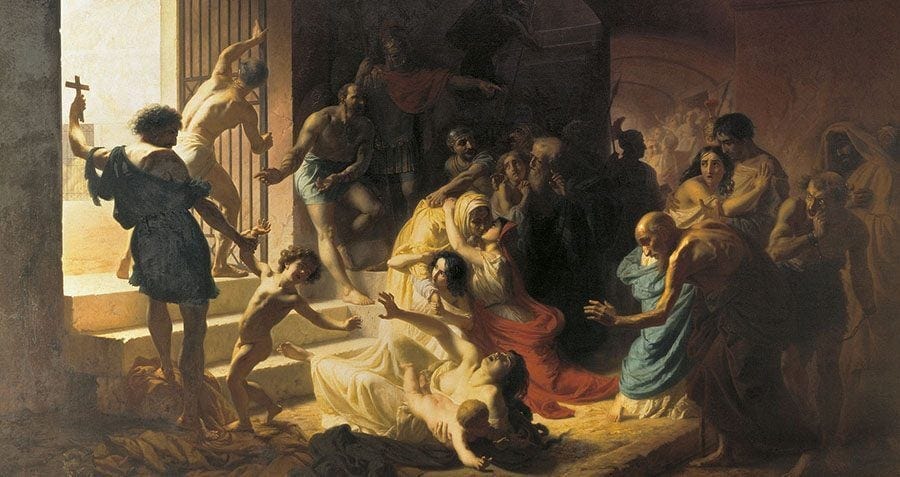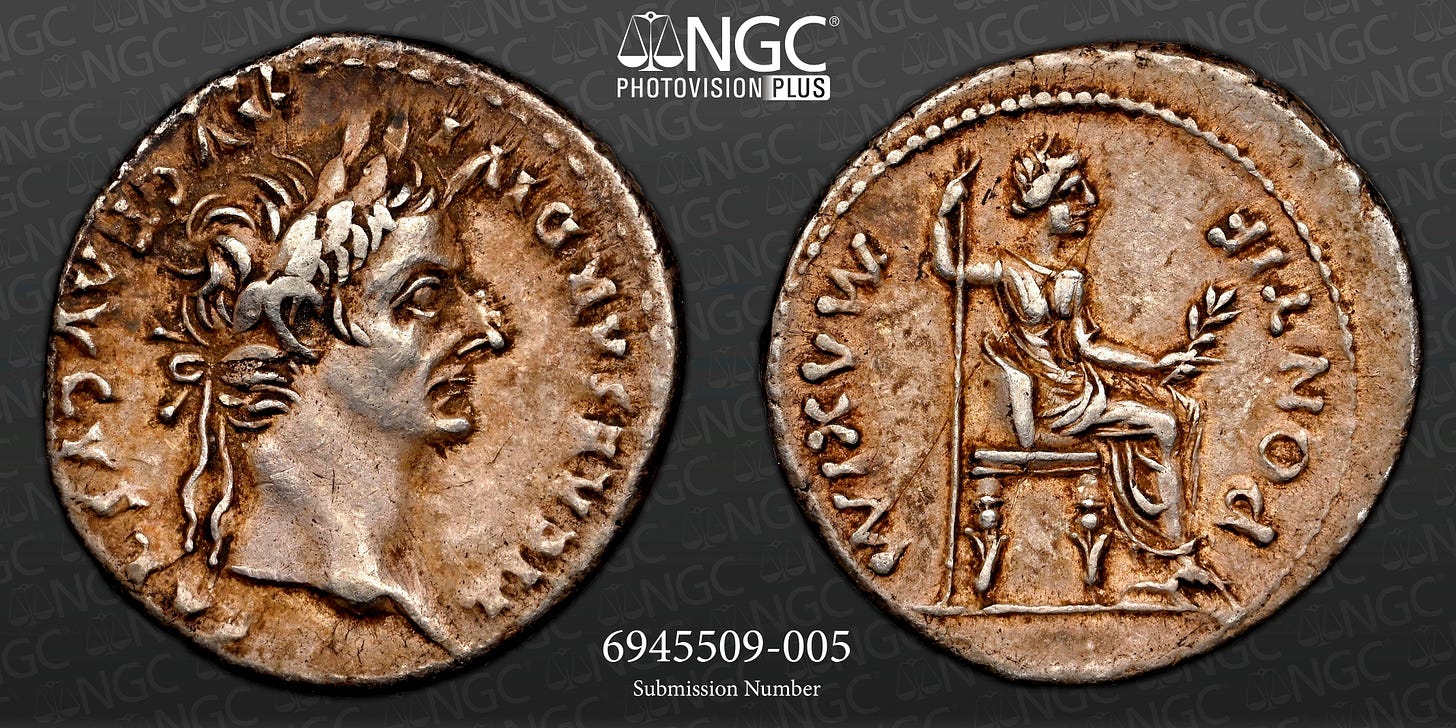Belong But Don’t Belong
living in a superpower society: a reflection on Brian Zahnd’s sermon for November 16th
This is the first of two sermon reflections for Sunday, November 16, 2025. In this essay I share my reflections about Brian Zahnd’s sermon, called Exiles in Babylon, based on Luke 21:5-19.

This week’s gospel reading :: Luke 21:5-19
5 When some were speaking about the temple, how it was adorned with beautiful stones and gifts dedicated to God, he said, 6 “As for these things that you see, the days will come when not one stone will be left upon another; all will be thrown down.”
Signs and Persecutions
7 They asked him, “Teacher, when will this be, and what will be the sign that this is about to take place?” 8 And he said, “Beware that you are not led astray; for many will come in my name and say, ‘I am he!’[a] and, ‘The time is near!’[b] Do not go after them.
9 “When you hear of wars and insurrections, do not be terrified; for these things must take place first, but the end will not follow immediately.” 10 Then he said to them, “Nation will rise against nation, and kingdom against kingdom; 11 there will be great earthquakes, and in various places famines and plagues; and there will be dreadful portents and great signs from heaven.
12 “But before all this occurs, they will arrest you and persecute you; they will hand you over to synagogues and prisons, and you will be brought before kings and governors because of my name. 13 This will give you an opportunity to testify. 14 So make up your minds not to prepare your defense in advance; 15 for I will give you words[c] and a wisdom that none of your opponents will be able to withstand or contradict. 16 You will be betrayed even by parents and brothers, by relatives and friends; and they will put some of you to death. 17 You will be hated by all because of my name. 18 But not a hair of your head will perish. 19 By your endurance you will gain your souls.
What did Jesus mean when He said what He said in Luke 21:6? As for these things that you see, the days will come when not one stone will be left upon another; all will be thrown down. He predicted the fall of the second temple and the destruction of Jerusalem. In the year 66, the Jewish-Roman wars started. The Romans crushed the Jewish revolt in the year 70, they surrounded Jerusalem, and, after a five month siege, the Romans destroyed the temple and the city of Jerusalem fell.
In 7th century BC Nebuchadnezzar ruled the Babylonian1 Empire, and the first wave of Jewish exiles found themselves deported from Jerusalem to Babylon. The exiles started in 597 BC, beginning with the elite, including the royal court. All who could mount a defence were exiled first. Initially the exiles thought their exile would be short.
Some false prophets predicted a 2 year exile. Jeremiah counters these false prophecies, said the exile would last decades, ie. many generations, he writes a letter to the exiles.
Take wives and have sons and daughters; take wives for your sons, and give your daughters in marriage, that they may bear sons and daughters; multiply there and do not decrease. Take wives and have sons and daughters; take wives for your sons, and give your daughters in marriage, that they may bear sons and daughters; multiply there and do not decrease. For I know the plans I have for you, says the LORD, plans for peace and not for harm, to give you a future and a hope. —Jeremiah 29:4-7.
Jeremiah says G-d is behind the exile, that Nebuchadnezzar serves as a mere instrument of G-d’s plan. He advises the exiles to move on with life, to build their life in Babylon. Jeremiah advises the exiles to learn to live as exiles and do not become Babylonian. Remember who you are. Remain faithful worshippers of G-d. Jeremiah urges the exiled Jews to assimilate but don’t let their assimilation devolve into apostasy.
Think of Daniel, who has a high position and doesn’t become Babylonian. When they refused to bow down to King Nebuchadnezzar‘s golden statue, the king throws Daniel’s friends—Shadrach, Meshach, and Abednego—into a fiery furnace. In the midst of the flames the king sees four figures, the three men and a fourth figure, who had a divine appearance.
Reader, belong but don’t belong.
What does Peter say in his first epistle? Let’s look at the opening and closing of 1 Peter. Note, Peter wrote it from Rome, the church is the “she” (Bride of Christ) to which Peter refers—think of Rome as akin to Babylon. Babylon has fallen and re emerges repeatedly in different iterations.
Peter, an apostle of Jesus Christ: To the elect exilles scattered throughout the provinces of Pontus, Galatia, Cappadocia, Asia, and Bithynia. —1 Peter 1:1
She who is in Babylon, elect together with you, sends you greetings. —1 Peter 5:13
Once baptised, we become citizens of heaven. Baptismal identity matters the most. In baptism, we become formally inducted into the kingdom of Christ. The baptised have to practise the delicate dance of exile, especially when living in a superpower nation or empire. Seek shalom of our nation don’t devolve into idolatry. Think of Superpower as an iteration of Babylon. We won’t bow down to the golden statue. A Christian cannot give religious devotion to his/her nation.
During the first three centuries of Christianity, Christians faced persecution because they wouldn’t bow down to the Roman Empire. “Caesar is Lord” was a Roman edict. Christians refused to say Caesar was Lord.
Roman coin of Tiberius Denarius via Roman Coins
Pastor Brian had a Roman coin in his pocket, it’s a coin featuring. Tiberius Denarius. On one side of the coin it reads “son of the divine, Augustus,” On the other side of the coin it reads, “chief priest of the Roman Empire.”
Luke 20:22-25 :: 22 Is it lawful for us to pay taxes to the emperor, or not?” 23 But he perceived their craftiness and said to them, 24 “Show me a denarius. Whose head and whose title does it bear?” They said, “The emperor’s.” 25 He said to them, “Then give to the emperor the things that are the emperor’s, and to God the things that are God’s.”
This segues nicely into The Epistle to Diognetus, an early church apologetic directed at critics of the church written about 100 years after Christ. The Greek author and recipients are otherwise unknown.
“Christians are no different from other people in terms of their country, language, or customs. Nowhere do they inhabit cities of their own, use a Strange dialect, or live out of the ordinary. They inhabit both Greek and barbarian cities, according to the lot assigned to each. And they show forth the character of their own citizenship in a marvelous and admittedly paradoxical way by following local customs in what they wear and what they eat and in the rest of their lives. They live in their respective countries, but only as resident aliens; they participate in all things as citizens, and they endure all things as foreigners.” -Epistle to Diognetus
Fifty years after the letter to Diognetus, Marcus Aurelius became the Caesar. He ruled the Roman Empire from 161 to 180. Marcus Aurelius permitted the official state persecution of Christians. In the year 180, Aurelius executed the 12 Scillitan Martyrs in Carthage. The martyrs’ trial and execution took place in Carthage under the proconsul Publius Vigellius Saturninus, whom Tertullian declares to have been the first persecutor of Christians in Africa.
The trial did not subject the accused to torture. We know the names of the twelve Scillitan Christians executed—seven men and five women. Their names were Speratus, Nartzalus, Cintinus (Cittinus), Veturius, Felix, Aquilinus, Laetantius, Januaria, Generosa, Vestia, Donata, and Secunda. The Scillitan Christians said they didn’t want to overthrow the empire and yet they would not comply with the command to worship the emperor nor would they serve the imperial army.

Speratus served as spokesperson, saying “I recognize not the empire of this world; but rather do I serve that God whom no man hath seen, nor with these eyes can see.” Speratus makes reference to 1 Timothy 6:16 :: It is he alone who has immortality and dwells in unapproachable light, whom no one has ever seen or can see; to him be honor and eternal dominion. The empire executed the Scillitan Christians on July 17th, 180.
This could take us back to what Jesus warned in Luke 21:16-19 (scroll up to see the gospel passage at the beginning). You will be betrayed even by parents and brothers by relatives and friends; and they will put some of you to death. You will be hated by all because of my name. But not a hair on your head will perish. By your endurance you will gain your souls.
Those who die as faithful people of G-d—for example the Scillitan Christians—become children of the resurrection at their death, they become citizens of heaven. And not a hair on their head is harmed.
This sermon ties in nicely with the theme of the second sermon for today that I’ll write about next, which focussed on Isaiah 40:31, the spiritual formation of the waiting season, and the important reminder to resist the allure of despair + cleave to G-d. Remember—G-d is with us, this is not the end, the end is joy.
In biblical terms, Babylon is used as a metaphor for empires, ie Egypt, Assyria, Persia, Greek, Seleucid, Rome.




